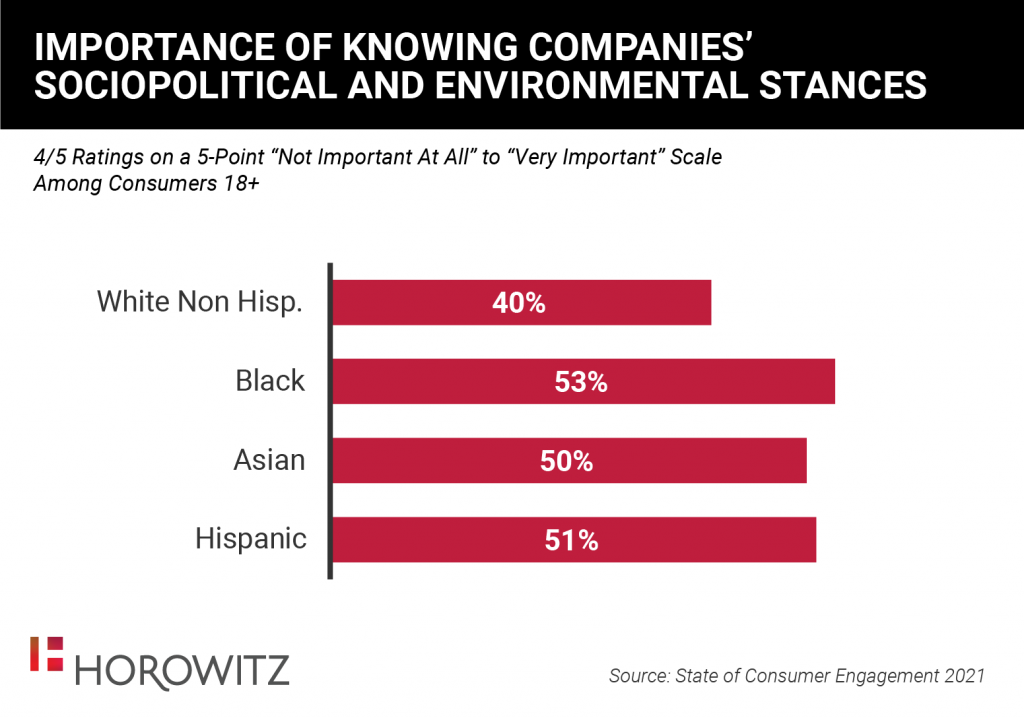New Research Indicates Brands Need to Improve Their Diversity Efforts
Consumers reported seeing more ads with diverse casts but significant numbers felt brands were “insincere” in their efforts towards diversity and inclusion

NEW YORK—A new report from Horowitz Research finds that six in 10 (58%) of consumers say that brands and advertisers are offering consumers “more ads featuring diverse people, lifestyles and cultures” and half of consumers surveyed feel like they are seeing “more companies making a sincere effort towards diversity, equity, and inclusion (DEI) in their business practices because they really want to do better.”
But the survey also found widespread skepticism about those efforts, with four in ten consumers—including 41% of Black, 38% of Asians, and 37% of Latinx/Hispanics saying they are seeing more “companies that are insincere in their efforts towards DEI because they just want to get more business.”
“What this means” noted Adriana Waterston, chief revenue officer and insights and strategy lead at the research firm, “is that companies must step up to the plate if they don’t want to be perceived as performative and pandering.”
The data is from the newly released report “State of Consumer Engagement 2021” from Horowitz.

The report and survey also provides insights into what companies can do to prove their commitment to diverse audiences and communities.
According to the study, 44% of consumers say it’s important to know companies’ socio-political stances so they can make choices about who to support with their dollars based on how aligned they are with their values.
In particular, the study reveals that Black (53%), Latinx/Hispanic (51%), and Asian (50%) consumers find it important to know a brand’s socio-political and environmental stances so they can factor that into their respective purchase considerations, more so than their white counterparts (40%).
Get the TV Tech Newsletter
The professional video industry's #1 source for news, trends and product and tech information. Sign up below.
The Horowitz study also found that over half of consumers have taken action either in support of, or against, brands based on their perceived alignment with their socio-political views. Some of the brands that consumers have supported positively (by spending more money with them or defending others who were critical of the brand) or negatively (by boycotting their products, calling them out in social media, etc.) are Amazon, Walmart, Chick Fil-a, Nike, and Coca-Cola, Horowitz reported.
To not be perceived as not simply going through the motions, brands must understand the values of their target market and actively demonstrate an alignment to those values, for example, by supporting and investing in local Black, Latinx, and Asian communities, the report noted.
Seven in ten consumers in the Horowitz survey say that it is important to them to see a brand’s commitment to the communities in which they place their businesses, such as through job creation, small business grants, and other substantial investments. The study also looks at other ways brands can demonstrate their support of diverse people and communities, such as by committing to spend advertising dollars in Black, Hispanic/Latinx, Asian media.
Waterston noted that “so many more companies have entered the multicultural space in the past year, but it’s not as easy as some might think to build trust among communities that have long been overlooked and undervalued. Moreover, between today’s socio-political climate and the transparency the internet and social media provide, it’s challenging for a brand to attempt to say one thing in their advertising but do something completely different when it comes to their political endorsements, their track record on worker’s rights, and their commitment to DEI internally with their hiring practices and so forth.”
Waterston also stressed that while diverse groups are generally aligned in terms of their expectations from brands, these groups are distinct and nuanced, they do not all think alike or have the same set of values. “This is why investments in research among diverse audiences is more important today than ever before,” Waterston adds.
For more information about "State of Consumer Engagement 2021" contact Sally Schachat at sallys@horowitzresearch.com.
George Winslow is the senior content producer for TV Tech. He has written about the television, media and technology industries for nearly 30 years for such publications as Broadcasting & Cable, Multichannel News and TV Tech. Over the years, he has edited a number of magazines, including Multichannel News International and World Screen, and moderated panels at such major industry events as NAB and MIP TV. He has published two books and dozens of encyclopedia articles on such subjects as the media, New York City history and economics.

